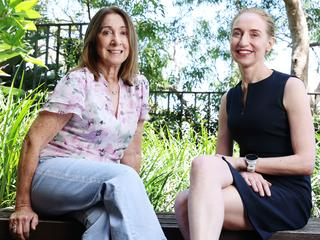'I feel like a walking miracle’: Groundbreaking melanoma trial defies all odds
By
Maan
- Replies 8
A terminal diagnosis can be devastating, especially when all options seem exhausted.
But every so often, medical breakthroughs defy expectations and offer a glimmer of hope where there was none.
A pioneering trial in Sydney has delivered astonishing results, challenging what was once thought possible for patients with advanced cancer.
Patients diagnosed with terminal melanoma were given a second chance at life thanks to a groundbreaking clinical trial in Sydney.
The trial, conducted at the Melanoma Institute Australia in Wollstonecraft, explored the effects of combining two immunotherapy drugs rather than using just one.
The results defied expectations, offering new hope to those whose cancer had spread to the brain.
Linda Kavanagh, a 71-year-old grandmother, was diagnosed with advanced melanoma in 2017, with 30 tumours throughout her body—seven of them in her brain.
‘I feel like a walking miracle, I feel like a miracle,’ she said.
When doctors first delivered the grim prognosis, she feared she would never see her grandchildren grow up.
‘I just felt numb and I kept thinking I won’t see my grandchildren grow up, I’m not going to see my daughters grow up,’ she said.
Kavanagh was accepted into the clinical trial, which tested the combination of two immunotherapy drugs, Opdivo and Yervoy, as an initial treatment.
This approach worked by supercharging the patient’s immune system, enabling it to target and destroy cancer cells.
Professor Georgina Long from the Melanoma Institute Australia revealed that 36 terminal patients received this combination therapy.
More than half were still alive seven years later—despite being given a prognosis of just 16 weeks.
‘What we can say, and we don’t like to use these words lightly, cure for advanced melanoma patients,’ Long said.
In just a few months, Kavanagh’s tumours began shrinking, and today she is cancer-free.
‘We’re not just saying pushing your survival out by a few months or years, we’re saying actually this cancer won’t be your problem,’ Long said.
These remarkable results could revolutionise cancer treatment, with similar immunotherapy combinations now being tested for lung, bladder, and triple-negative breast cancer.
Patients with advanced melanoma that has spread to the brain can already access this treatment free of charge.
Find out what researchers have discovered about melanoma.

With breakthroughs like this reshaping cancer treatment, could we be on the verge of turning more terminal diagnoses into survival stories? Let us know your thoughts in the comments.
But every so often, medical breakthroughs defy expectations and offer a glimmer of hope where there was none.
A pioneering trial in Sydney has delivered astonishing results, challenging what was once thought possible for patients with advanced cancer.
Patients diagnosed with terminal melanoma were given a second chance at life thanks to a groundbreaking clinical trial in Sydney.
The trial, conducted at the Melanoma Institute Australia in Wollstonecraft, explored the effects of combining two immunotherapy drugs rather than using just one.
The results defied expectations, offering new hope to those whose cancer had spread to the brain.
Linda Kavanagh, a 71-year-old grandmother, was diagnosed with advanced melanoma in 2017, with 30 tumours throughout her body—seven of them in her brain.
‘I feel like a walking miracle, I feel like a miracle,’ she said.
When doctors first delivered the grim prognosis, she feared she would never see her grandchildren grow up.
‘I just felt numb and I kept thinking I won’t see my grandchildren grow up, I’m not going to see my daughters grow up,’ she said.
Kavanagh was accepted into the clinical trial, which tested the combination of two immunotherapy drugs, Opdivo and Yervoy, as an initial treatment.
This approach worked by supercharging the patient’s immune system, enabling it to target and destroy cancer cells.
Professor Georgina Long from the Melanoma Institute Australia revealed that 36 terminal patients received this combination therapy.
More than half were still alive seven years later—despite being given a prognosis of just 16 weeks.
‘What we can say, and we don’t like to use these words lightly, cure for advanced melanoma patients,’ Long said.
In just a few months, Kavanagh’s tumours began shrinking, and today she is cancer-free.
‘We’re not just saying pushing your survival out by a few months or years, we’re saying actually this cancer won’t be your problem,’ Long said.
These remarkable results could revolutionise cancer treatment, with similar immunotherapy combinations now being tested for lung, bladder, and triple-negative breast cancer.
Patients with advanced melanoma that has spread to the brain can already access this treatment free of charge.
Find out what researchers have discovered about melanoma.
- Unbelievable Breakthrough: Spider and Crab Peptides Might Be Your Future Melanoma Cure! Discover How!
- New developments reveal Melanoma vaccine cut death risks by half
Key Takeaways
- A clinical trial in Sydney tested a combination of two immunotherapy drugs, Opdivo and Yervoy, to treat advanced melanoma, showing promising results for patients with brain metastases.
- Linda Kavanagh, diagnosed with terminal melanoma in 2017, had 30 tumours—including seven in her brain—but after participating in the trial, her cancer disappeared.
- Professor Georgina Long stated that 36 terminal patients received the treatment, and more than half were still alive seven years later, despite initially being given just 16 weeks to live.
- The success of this treatment is now influencing research into other cancers, such as lung, bladder, and triple-negative breast cancer, with patients already able to access it for free.
With breakthroughs like this reshaping cancer treatment, could we be on the verge of turning more terminal diagnoses into survival stories? Let us know your thoughts in the comments.








